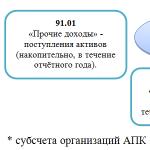
Regional tax policy as the direction of tax policy of the Russian Federation. The role of the regional tax system in the development of the economy and the social sphere The main characteristics of regional tax policy
In the formation of a tax policy, the authorities of the subjects of the Federation are faced with a number of problems, among whom the author especially allocated a limited toolkit of regional tax policy, determination of categories of taxpayers or species economic activity, provision tax benefits For which will have an economic and social effect.
Despite the improvement of the tax policy of the Russian state, expressed in reducing the tax burden on the economy, the implementation of important measures to simplify the country's tax system by establishing a closed list of taxes, reducing the number and unification of tax bases, rules and procedures for paying specific taxes, the formation of regional tax policy for long-term The period is not finished yet. In the regional system tax relations There are significant problems, many of which are not solved.
To date, many fundamental theoretical and practical issues of taxation are not solved. These include numerous problems. tax administration, calculating and paying specific types of taxes. There is no single position on the feasibility of further reducing the tax burden, there are no specific decisions on the issue of tax stimulation of innovative and investment activities in the region, for real estate taxation. When performing attempts to stimulate taxpayers of the Orenburg region there is no clearly defined system. The activities carried out and do not allow to achieve a significant change in the current statement in innovative Development Economy. There is no clear position in solving the most important issue to the region of taxation of small and medium businesses.
The practice of applying tax legislation is seriously complicated by an insufficient regulatory framework, leading to solving problems of lack of tax legislation at the level of case law law, including in the Orenburg region.
The problems of the region's tax policy are seriously affected by its tax climate, violate the budget revenue system, worsen investment attractiveness, imperative innovative development.
The second group of problems studied in work is that the ongoing tax policy of the Orenburg region does not fully take into account the conditions in which the region's economy is located. The solution of the task is practically significant - evaluating the parameters of the functioning of the tax system by studying the tax burden indicator and identifying the tax potential of the regional economy.
By definition of the author, the "tax potential" in a broad sense is the total amount of taxable resources of the territory, and in a narrower sense - is the maximum possible amount of taxes and fees calculated in the conditions of current legislation.
The magnitude of the tax potential of the territory is influenced by many factors, both objective and subjective. The first includes existing tax legislation, the level of development of the regional economy, its sectoral structure, level and dynamics of existing prices, volume and export and import structure, etc. Subjective factors are considered the state of regional tax policy, the number of benefits provided and delay, etc.
Without an accurate assessment of the tax potential, the development of the budget projects of various levels is unrealistic for the coming period, since it plays an important role in improving the budget planning process.
The third group of problems under investigators the graduation workThis is that in the state regional tax policy, a fiscal approach to the issues of the tax control is considered to be prevailing. The orientation of the tax control system mainly on mobilizing additional funds to the budget does not fully reflect both the inner essence of tax control and its place in the economic and financial System. In modern realities, control acts not only as a fiscal instrument, he, the main thing, should carry out a regulatory function aimed at developing the economies of the region by bringing the equal terms of participants in economic activity. It is such an understanding of the tax control makes it a long-term tax policy tool.
From the level of the organization of tax control, its effectiveness depends on the possibility of achieving the strategic and tactical objectives of the tax policy.
Tax control should be considered as a system of management of tax relations functioning within the framework of legal space and regulating the organization money In the interests of both the region and the state, as well as the measures of responsibility for tax offenses as a functional element of the Tax Relationship Management System.
Research and analysis of the current state of test work, the possibilities of managing the FTS in the Orenburg region for its implementation make it possible to conclude that it should act not only in the role of a fiscal tool, but also to be a regulator built into the economy. This statement is based on the following parcels:
1) tax control as one of the most important tools of tax policy inevitably has a high proportion of subjectivism and is considered an instrument in the hands of the state, and the tool, at the expense of which they try to achieve not only economic (financial) results;
2) From how much the system of tax control is not subject to (i.e., how low the degree of influence of the goals of specific individuals or groups) depends on the level of development of society and the economy. If the state builds a tax control system on the principles of equality of all before the law, and also, if political goals are not achieved due to tax control, tax control can be considered from the point of view of the built-in market mechanism, the main task of which is determined to create equal terms of management and non-competitive advantages. ;
3) The strategic task of tax controls, as well as tax policies in general, should be understood as the maximum attraction of taxpayers to independent (voluntary) pay all taxes and fees.
Such an understanding of tax control is based on the following restrictions and arguments:
a) due to revenues from tax control activities, no more than 5-7% of the funds of the budgets of various levels can be ensured (this trend is traced both in the Russian Federation and in the Orenburg region), and the tendency is clearly such that this indicator is only reduced. Even very significant detachments of recent years have been conjugate with significant problems of recovery of decisive payments, and general level The recovery though also tends to increase (now it is about 45%), but even its positive dynamics lags behind the growth rates of taxes and fees, i.e. voluntarily paid amounts;
b) the main effect of test work should be recognized not to propagately on the departure and cameral checks, and the level of current tax collection. This principle means that the taxpayer then fully and in time pays all the established taxes when aware of the level of risk of adverse effects of tax control. Thus, from a fully fiscal tool, tax control goes into the sphere of the regulator, the presence of which encourages (sometimes it seems) to pay taxes and fees independently;
c) large-scale and full-fledged tax control activities, and under which only today's visits are understood today, no more than 4--5% of taxpayers may be covered (and for last years In the Orenburg region, this indicator, the so-called inspection coverage, decreased to 3--4%). From here it follows that full-scale control is a measure forced and point, should be applied only in cases of a significant violation of tax legislation. Moreover, to obtain a proper effect, the use of GNP should be carefully planned, analyzed and rationally organized.
At the same time, to achieve the control as a regulator of its goals, a high openness of tax administrations need to promote the issues of compliance with legislation, when cases of large detachments, disclosure of minimization schemes and tax frauds are set as examples of adverse consequences.
The more the society knows about the efforts and success of tax services, the greater the number of business entities will strive to avoid tax control, and avoid not through the complication of schemes and the invention all new ways to care from paying taxes, but on the contrary, openness and full repayment of tax liabilities;
d) Today, the most promising direction of control is considered to be the monitoring of the taxpayer with the identification of tax risk areas, and when there are certain threshold criteria in these zones - carrying out full-scale control measures.
Thus, the tax control should be as soft as possible and not visible towards conscientious taxpayers, in relation to the same unscrupulous response measures should be rigid and immediate. If the tax control is organized on such principles, it can act as an entry-made regulator (built-in regulator). Naturally, in order for the control to become an embedded regulator, the independence of the tax service in decision-making, both to the appointment of control measures and their results, is necessary. It is these principles of the organization of tax controls can be the basis for the conduct of effective tax policy.
The fourth group of problems is in the absence of an effective system of measures capable of organizing tax administration to become a serious factor in strengthening the current tax policy of the Orenburg region. Special emphasis must be done on modern tax relations management systems. In mandatory, this system should have clear feedback with taxpayers, for a speedy response to ever-changing conditions for functioning.
Despite the serious results already achieved by the tax authorities of the Orenburg region, both to collect funds into the budget and the improvement of the mechanisms of control and tax charges, the level of these achievements is still insufficient. That is why it is necessary to put the organization for the fore tax processwhich includes a whole range of goals and objectives - from automation and computerization of the tax inspector to approbate new methods of control and work with taxpayers.
The level of tax administration is influenced by a number of factors of an objective and subjective nature. The following reasons revealed in the Orenburg region to have a negative impact on the effectiveness of tax administration and complicating its subjects in modern conditions.
The main task of tax authorities is considered to conduct effective tax administration aimed at raising the level of tax collection, optimizing the structure of taxation and self-improvement. The very concept of "tax administration" can be defined as the management of the process of interaction between participants in tax legal relations.
With a deeper consideration of the process of reforming the administration system, it becomes obvious that the impact on certain areas of internal work of the tax authority cannot be considered to solve the problem. A whole system of measures is needed, which is the relationship of both internal and external factors aimed at building such a complex organism as a state tax system. Such a system should be able to seek domestic reserves and critical and adequately evaluate the results of its own activity.
The initial stage of planning systemic transformations should be an analysis of the state and trends in the development of a number of fundamental internal factors capable of affecting the effective course of the general reform process. In the course of the study, the author came to the conclusion that such factors should include the following:
1) a subjective factor that reflects the assessment of the possibility and willingness of employees to participate in the process of improvement on the basis of the level of training, the ability to adapt to work in new conditions; computer literacy and desire to increase it; individual, psychological features of a person, orientation in a certain direction of activity, location in a structural unit, etc.;
2) The information and technical factor is based on analyzing the provision of technical means, determining the necessary and sufficient level of technical equipment of each workplace. The factor is aimed at the development of a local computing network, which combines the tax authorities of all levels into a single information and technical system and determining the optimality of using technical equipment from the point of view of the cost of their maintenance and maximizing the labor productivity of the inspector when using them;
3) The organizational factor is to optimize the organizational structures of tax authorities that can satisfy and flexibly respond to changes in both the external environment and the functioning of the tax authority. Grouping and optimal distribution of procedures and functions between structural units. Determining the process of interaction between structural divisions and a clear execution of this process. Permanent monitoring of the nature of the functions of this or another division. Analysis of the implementation of each function for optimality. The organization of the process of constant improvement of the structure as a whole and each function separately. Bringing to taxpayers new principles of functioning of the institution;
4) the institutional factor is the definition of personnel policy of the institution to consolidate the functions of workers and units with the consolidation of their status; establishing certain norms and rules both within a facility and when interacting with other tax administration institutions; Determination of the procedures for the interaction of inspection with other persons and organizations; Organizing subordination in accordance with the requirements of higher organizations and identify the status of each of the organizations of systems.
The characterized factors are recognized as complementary components of interconnected systemic administration processes and should not be considered as separate stages of optimizing the operation of tax authorities. For example, when determining the number of employees of the UFNS Unit of the Orenburg region, the optimal result will be obtained only after a comprehensive analysis of the implementation of any function, establishing the nature of the function to this unit, determining the necessary level of automation, training and computer literacy of employees, training costs and retraining of employees.
Summarizing the above, we note that the inalienable part of the tax policy should be to improve the principles of tax administration. Significant attention should be paid to measures to improve tax administration directed, on the one hand, to prevent the practice of tax evasion by correcting the existing flaws in the legislation on taxes and fees, and on the other, on the unconditional provision of legitimate taxpayers' rights. It is necessary to continue the line of strengthening the protection of taxpayers from the unlawful requirements of tax authorities and creating more comfortable conditions for taxpayers to pay taxes and fees. This is mainly related to law enforcement and procedural issues. The ultimate goal of the transformations carried out in terms of reforming the administration system should be a decrease in the administrative load in the tax sphere, which negatively affects the advantages of a relatively low tax burden in the country.
The tax policy is formed and implemented at the federal, regional and local levels within the relevant competence. At the regional level, the regulatory system can be carried out on those taxes that legally enshrined the subjects of the Russian Federation, or within the established rates on regulatory income sources (tax). The tax policy in the region is a set of economic and legal measures at the region level to improve the tax system in order to ensure the financial needs of the region and the state as a whole, the implementation of the planned socio-economic programs through the redistribution of financial resources and changes in the direction of financial flows. Regional tax policy is produced at the regional government level in accordance with the accepted strategy (program) of socio-economic development on medium-term and long-term periods, depending on the state of the economy and other factors, as well as the goals that are accepted as priority at this stage of development. The main tasks of regional tax policy are:
Increasing tax potential, including based on stimulating investment in the real economy of the region;
Methodical and informational support of the tax process at all its stages;
Strengthening measures to strengthen tax discipline in close cooperation with other regulatory authorities, as well as law enforcement agencies and, as a result,
Increasing tax collection;
Improving the qualifications of tax authorities, including by obtaining second education in the highest financial and economic educational institutions.
Tax policy is divided into tax tactics and tax strategy. The tax strategy defines the policies of the region regarding the existing tax system in the long term. The concept of tax tactics provides for the solution of the tasks of the short-term period, as a rule, less, but no less important, since they are a condition for the implementation of the tax strategy. The strategy for the development of the tax potential of the region directly and indirectly depends on the availability of various types of resources with which it has, regardless of whether they are used or not. And these resources must first be evaluated. The value of the region's resources may vary in time; Similarly, their ability to cause income (degree "liquidity") can also be changed. The tax mechanism is considered in the work as a set of relations, funds, techniques, methods, methods with which taxes are established and calculated, and the taxpayer performs the obligation provided for by the Constitution of the Russian Federation established taxes. In general, the tax mechanism consists of two main elements: relations on the calculation of taxes and relations to pay them. As an additional element, relationships associated with information support and documenting the execution of tax liabilities are distinguished. Today at the regional level, the problem of improving the tax mechanism and tax control is increasingly updated federal taxes (VAT, payments for the use of natural resources, tax on mining, the income tax, etc.), but, above all, the main taxes of the subjects of the Russian Federation (tax on property of enterprises, transport tax, gambling tax, etc. ) And local taxes and fees, consistently distributing their types of economic activity, which for one or another reasons were "shadows". One of the directions of improving the Tax System of the Russian Federation is to improve the planning and forecasting of the tax potential of the region. The purpose of tax planning, both at the federal and regional levels, according to the author, is the assessment of the ratio of tax potentials of territories and actual tax revenues, and tax forecasting is the determination of possible volumes of tax payments in the planned and forecast periods. Tax administration is the main function of the system of state regulation of financial flows. The goal is to receive, process and integrate a variety of information on administrative and executive actions in the planning and implementation process. tax operations (and their results), initiating changes in tax legislation. Tax administration is part of the regulation of the filling processes of the budgets of all levels. The main task is to ensure the gradual increase in the tax potential of the Federation and regions. The tax administration system includes four basic elements (planning, regulation, control and reporting), developing in conditions of changing causal dependencies of the tax environment from external factors. A characteristic feature of increasing tax planning value in tax government agencies It is the closer linkage of the planned activity of the Federal Tax Service of Russia and territorial tax inspections in the field. Tax regulation is the second important functional block of the tax administration system. The third element of the tax administration system is tool control. It emphasizes that tax control not only has functional relations with tax planning and regulation. It accompanies all stages and tax planning, and tax regulation, being the core of the tax administration system. State tax control is being implemented in various fields of tax relations on behalf of the state and in the interests of the state. The control activity of both state-power bodies and subjects of the corporate environment requires very significant financial costs, and the control results are characterized by fiscal consequences: for tax administrators, this is a set of tax income, and for taxpayers are tax expenses. The paper emphasizes that control is a specialized sector of information support for the set of procedures for the adoption and implementation of tax decisions, which provides information from tax administrators about various deviations from the installation indicators (predetermined tax base parameters). At the same time, the framework of state tax control is limited to such principles as legality, economic substantiation, expediency, compliance of the form of content, rationality, effectiveness. State tax control (in relationship with tax accounting and tax reporting) is the basis for the formation and functioning of the state information system on the revenue of the consolidated budget of the country and regions. Such information system allows, in particular, to establish the degree of sufficiency of tax resources budget system To meet socially significant needs, to fulfill the country's financial obligations to creditors. Tax control through feedback Creates the ability to regulate tax streams at all levels of management, thereby ensuring the effectiveness of tax administration. Thus, regional tax policy has a special status, which is functionally complementing the right to the regulatory role of the national federal policy, mobilizing tax revenues, ensuring tax collection and replenishment of budget potential. The regional tax system operates in conditions of limited independence, which forms special principles of tax policy. The most important of them are: competent taxation; collecting all taxes and control over it; a special, supplemented by the regional component, the regulatory and legislative framework, ensuring the effective functioning of the regional tax system; initiatives to increase the stimulating tax function; Innovations in the field of motivation of the activity of tax authorities.
UDC 336.051
Regional tax policy of Russia at the present stage
O.A. Lyakh, A.M. Grinevich
Tomsky state University E-mail: [Email Protected]
In order to implement the active investment development of the regions, the formation of a real interest in increasing tax potential, it is required to adjust the regional tax policy existing in the Russian Federation. The article presents the organizational issues of the formation of regional tax policies; It is proved by the impossibility of implementing subfederal authorities of modern regional tax policy; Approaches to its improvement are offered.
Keywords:
Regional tax policies, tax competence, tax revenues of regions.
Tax policy is intended to be the most important component of the state economic policy, providing the formation of federal, regional and local budgets, promoting the development of production, entrepreneurship, which encourage investment activities.
For a long time, the main emphasis in the development of tax policies, at all levels of government was not made on the regulatory (economic) tax function, but on the fiscal - the maximum possible increase in tax revenues to the budget in the short term. As a result, the modern Russian tax system is characterized by a bright fiscal orientation and requires improvement, since it does not ensure the necessary filling of budget revenues of all levels.
Regional tax policy, according to the authors, is the activities of regional government bodies on the management of various elements of regional taxes (rates, benefits, period) by tax legal relations, regional tax laws.
Two stages can be distinguished for regional tax policies: 1) formation; 2) implementation.
At the stage of formation of regional tax policies occurs:
Determining the goals and objectives of regional tax policy within the framework of the general economic Strategy countries in general and separate region;
Regional tax legislation is being developed;
Tax component is considered budget process region;
As a result of the formation of regional tax policy, the tax system of the respective region and the mechanisms of management of it are determined.
At the stage of implementation of regional tax policies occurs:
Ensuring the receipt of taxes and fees at all levels of the budget system;
Testing and improving regional tax legislation;
Development of personnel component of regional tax policy;
Ultimately, the need to make changes to the current regional tax policy, or the development of a new regional tax policy is substantiated.
During the implementation of the Regional Tax Policy, the Tax System of the Region is adjusted; Improved management mechanisms.
It should be noted that the formation and implementation of regional tax policies are closely interrelated and are in constant development in accordance with the changing priorities of the state economic strategy.
The algorithm of activities related to the organization of regional tax policy can be represented as the following blocks.
1. Analysis of the current state of the tax potential of the region and the prospects for its development.
2. Drawing up plans, i.e., making decisions on the future socio-economic purposes of the region and how to achieve them, including tax methods.
3. Implementation of planned solutions. The result of this activity is real economic indicators: Increase welfare, investment activity, tax collecting, etc.
4. Comparison of real results with planned indicators, as well as the creation of prerequisites for adjusting the actions of the region in the right direction.
5. Control, which is the last block of regional tax policy, and, allowing to evaluate the effectiveness of the planned process in the region.
Economy
Important elements in the regional tax policy process are:
Financial and credit provision of regional tax policy;
Material and technical support of regional tax policy;
Organizational and legal and regulatory support of regional tax policy (laws, decisions, guidelines, etc.);
Recruitment of regional tax policy;
Information support of regional tax policy.
One of the most complicated tasks of the tax policy is considered to be the implementation of measures to create an adequate tax system, which ensures the effective regulation of economic processes related to the formation, distribution and use of income.
However, the distribution of financial and tax competence in the Russian Federation allows us to talk about the impossibility of implementing the subfederal authorities of modern regional tax policies.
The main regulatory document governing the tax competence of all participants in tax relations, as well as official approaches and principles for the construction of the Tax System of the Russian Federation, is the Tax Code. With regard to the tax competence of the authorities of a different level, it is currently following (Art. 5, 12 of the Tax Code):
Tax Code (i.e. federal) establishes an exhaustive list of taxes: federal, regional and local;
Regional and local governments have the right to enter or not enter established by the Tax Code, respectively, regional and local taxes (appropriate laws or regulatory acts should be taken);
The Tax Code establishes the main elements of tax liabilities on regional and local taxes;
Regional and local authorities have the right to set their rates (within the amounts allowed), the procedure and timing of the payment of taxes and can establish tax benefits, grounds and procedures for their application. The structure of the tax system is defined by Art. 13
NK. It turns out that the most valuable taxes are fixed in the federal level. Therefore, most federal
logs perform budget and tax regulation functions, and the real opportunities for the implementation of regional tax policies are extremely small.
So, at present, the level of income of regional budgets is directly dependent on the provisions of federal legislation aimed at the centralization of financial resources at the federal level (see Table 1 *).
Table 1. The ratio of revenues of various budgets of the Russian Federation in the period from 2001 to 2006,%
2001 2002 2003 2004 2005 2006
Federal budget 49 59 62 46 52 49
Subjects budgets 30 28 28 37 39 42
Local budgets 21 13 10 17 9 9
At the same time, a feature of the revenue part of subfederal budgets is a high proportion of regulatory taxes and gratuitous transfers from the federal budget, as well as the low proportion of own income, Table. 2.
Table 2. The structure of revenues of consolidated budgets of subjects in the Siberian Federal District,%
2001 2002 2003 2004 2005 2006
Total income, incl. 100 100 100 100 100 100
Regional taxes and fees 13.6 12.7 10.5 7.5 6.2 6.7
Taxes entering standards (regulating) 58.4 56.9 62.9 71.3 67.2 67.8
Gratuitous arrivals 28.0 30.4 26,6 21.2 26,6,55
There is also inconsistency and "chaoticity" in the formation of income regions, which leads to the preservation of regional asymmetry and is the basis for the change in the composition of federal taxes in favor of regional and local budgets, Fig. 1-4. 100% 90% 80% 70% 60% 50% 40% 30% 20% 10% 0%
Fig. 1. Distribution of federal taxes between the levels of the budget system in the districts of the Russian Federation for 2005
* Table 1, 2, Fig. 1-4 Compiled on the basis of information presented on the official websites of Rosstat, the Ministry of Economic Development of Russia, the Federal Treasury and the FTS of Russia.
100% 90% 80 °% 70 °% 60% 50% 40% 30% 20% 10% 0%
- ♦ -Federal taxes and fees - □ ■■ Regional taxes and fees. - Local taxes and fees
renia, their real interest in increasing the income base, the implementation of investment development.
2. Distribution of federal taxes between the levels of the budget system on the subjects of the Siberian Federal District for 2006
70% 60% 50% 40% 30% 20% 10% 0%
□ Regional budget ■ federal budget
Fig. 3. Distribution of all tax revenues on the levels of the budget system of the Russian Federation on the subjects of the Siberian Federal District for 2006
Such an organization of financial flows and the existing volumes of tax authority in the regions provoke a low interest in the subjects of the Federation to increasing the tax potential, the impossibility of providing tax benefits and advantages, the emergence of dependent sentiment, financial and political dependence on the Center.
Thus, today it is worth the task of organizational and legislative formation of regional tax policy, adequate to the strategic goals of the country's development, ensuring the reliable financial existence of
Fig. 4. Distribution of tax revenues collected in the territory of the Tomsk region at the levels of budgets for 1999-2007. (according to regional financial management)
In order to form in Russia, modern regional tax policy is offered:
Expand the composition of taxes assigned to regions and municipalities, which will automatically lead to an increase in tax competence;
Increase the volume of tax competence on special tax regimes;
Strengthen financial basics The activities of the regions and municipalities, in order to emerge a real interest in building up and strengthening the tax potential, the formation of modern regional tax policies.
It should take into account the specifics of the specific conditions of the regions, their geographic location, industry specifics, tax potential, use the methods of scenario planning and forecasting in the development of the concept of tax policy, to align the state and regional strategic development goals and use of an adequate tax mechanism to achieve them.
















